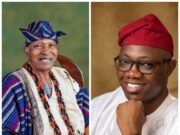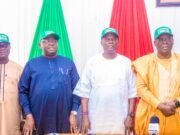It’s no longer news that the rising rage of the pathogen called COVID-19 has necessitated drastic adjustments in all critical spheres of public, and conceivably private, life. One of the many casualties of the rave of the virus is mass gathering. In many places around the world a ban has been sensibly slammed on mass fellowship and social distancing encouraged to curtail the spread of the disease. All of these and more are gradually becoming the new normal (hopefully for a short time) and as such less newsy, even in a few places like my current city of abode, which thus far have manageable records of infected persons.
However, what is perhaps newsy is the foolishness of certain rulers in Nigeria where the virus is still actively in rehearsal mode. You would think the rulers would use the opportunity the minimal presence of the virus offers to borrow some thinking caps and emplace precautionary measures. Rather, in both Abuja and Ibadan, as well as other places in the country, the demons of foolishness masquerading as leaders acted in their characteristic manner and thereafter justify it as an innocent mistake. Pray, what was more important, the empty, self-serving shows of tyrant Muhammadu Buhari and charlatan Seyi Makinde or the lives of the people?
One of those two foolhardy minds have since issued a tepid, risible mea culpa, thus projecting a virtue he should have cultivated before seeking public office. Well, maybe Makinde is heeding the words of Shakespeare – feign virtue even though you lack it. In contrast, the big masquerade in the marketplace of gross insensitivity and punishing wickedness, Buhari, has as usual stuck to his gun and would favour no pretence like the Oyo intriguer. It’s still somewhat surprising that there are many Nigerians who expect General Buhari to give what he doesn’t have. Let’s remind those folks that their dictator is hobbled mentally and physically. Accordingly, he’s incapable of lifting a finger in times when effective leadership is most needed. He’s become the proverbial crab that continues to waste the time of those waiting to see it blink.
Since Makinde’s trumpeted acknowledgement of his folly, his many uncritical and ethically vacillating supporters have been instructing the country to willy-nilly see his barren statement as evidence of uncommon leadership. Again, this insistence is another example of foolishness. Trapped in the dizzying whirligig of idiocy, these supporters don’t see how Makinde’s decision to hold a political rally in the season of a raging virus reflects his poor leadership capacity and low sense of judgement. These easily excitable supporters have also forgotten how his tardy response to the issue of garbage disposal endangered the public. They forgot that he assumed office without any clear plan on how to deal with this issue which predated his ascension to power. He acted only when the bird of that issue grew stronger wings and became more assaultive. It appears Makinde’s strategy is to allow a bad matter to go worse before he intervenes, all with the main objective of portraying himself and his administration as a messiah, a people-friendly governor. But those who are mentally vigilant and strong on critical thinking understand that Governor Makinde is hiding behind a finger and his supporters merely winking in the dark.
In thinking about Makinde’s, indeed Nigerian rulers’, actions in office and leadership incompetence, I’m reminded of one of Chief Obafemi Awolowo’s increasingly relevant speeches, entitled “Politics and Religion.” The late cerebral premier of the defunct Western Region delivered this lecture to students at the Adventist College of West African, Ilishan Remo, on January 27, 1961. The speech is loaded with deep insights about politics, religion, and education. His position on the leadership recruitment process, nay the kind of people to be accorded public leadership lecterns, remains relevant as a nugget of wisdom in a time of unrelenting leadership recklessness (the norm in Nigeria). Travel with me into that treasure trove of thinking as I quote from it in extenso:
“In private life, before we entrust our personal or business affairs to anyone, we take steps to inquire into [their] qualifications both as to competence and character. Such an inquiry as this is done in private, because what is at issue is a private concern. But the competence and character of politicians must of a necessity be examined in the full glare of public limelight. Because what is at issue is the welfare of the community or nation. In the management of private affairs, a gross mistake would only affect the fortunes of one [person] or a family or a small group of persons. A serious error of judgement in the management of public affairs might adversely affect the lives and fortunes of millions of people. For this reason, there is need for the competence and character of public men [and women] to be subjected to severer and stricter scrutiny – and that mainly in public – than those of persons engaged in private concerns” (178-9).
Like many rulers across Nigeria, both Buhari and Makinde came into office because their predecessors proved to the easily trusting compatriots that the offices were above their ken. But in “electing” them into office, most voters were less concerned about the characters and competences of these current rulers. If any character and competence were ascribed to these men (patriarchy is still the thing here), most voters didn’t bother to scrutinize them. These voters gave no thoughts to how bad policies emplaced by those incompetent fellows they voted into public offices could ruin them. As in his predecessors, Buhari’s actions in office in the last six years have further shown the tragedy that can result from putting incompetent minds into office. As Awolowo argues in that speech, the serious errors of judgement from a leader can be destructive and widespread in scope. Many Nigerians are already witnesses to this fact. And in Oyo, we are seeing a governor whose exaggerated competence is endangering lives.
It must be stressed to Makinde that if he seeks to be different from his immediate loud, cocky, insensitive, and immoderate predecessor, he must do so in substance – not on the wings of the superficialities that he is besotted to. If he feigns virtue and leaps to the stage to apologize for an action kindergarten minds would not venture near, he must also heed Shakespeare’s exhortation that ambition must be made of sterner stuff. He sought to be a governor. He is now that. He should oil that wheel with the lubricant of sound visionary leadership. Omi Tuntun is insufficient in and of itself without the substance of real life-transforming actions. With the transition in Oyo, there must be enduring transformation.
In all, the point that Nigerians would need to adopt a change of mind in the way they generously gift incompetent minds with leadership positions can’t be overemphasized. It’s one of the things they must do to break free from the band of inadequate and COVID-19-like rulers. If Nigerian continue to favour mere complaints in times of absent leadership, blind support of poorly performing rulers, and rationalize absurd apologies for avoidable, damning errors from their rulers, more misery will dog and define their sorely stressed lives.
In this season of COVID-19, Nigerians are encouraged to maintain recommended precautionary measures, and be wise not to put all their thinking caps in the fraying baskets of the rulers they now know are everything but reliable!
Ademola Adesola is a researcher at the Department of English, Theatre, Film and Media, University of Manitoba, Canada


































